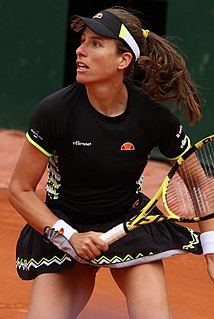Top 106 Quotes & Sayings by Johanna Konta
Explore popular quotes and sayings by a British athlete Johanna Konta.
Last updated on December 21, 2024.
I was 14 in Barcelona, and when I initially went there, I didn't see my mum for six months and my dad for four months. Australia is far from Spain, but I don't remember how long or how short the days felt. I think what was most difficult for my parents was that if anything went wrong, they couldn't say, 'OK, we'll be there in a couple of hours.'
What is best to hope for and what everyone is working towards is to elevate the quality of women's sport and to bring it to a level where it is seen as something that is very entertaining, something to be admired, to be looked up to, to put it in that level playing field as a product to be sold equal to the men.
I was a decent 800 m. runner, not 400 - and I'm actually really proud of this: I beat the girls and the boys to win my school 800, so it was a big deal at the time; I was about 11. Then I won the district and made it to state, but I just never went, because I was training, and tennis was a big part of my life at that point.






















